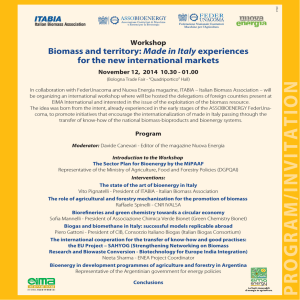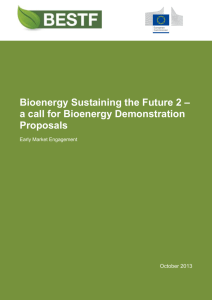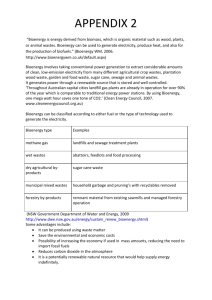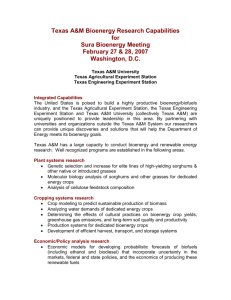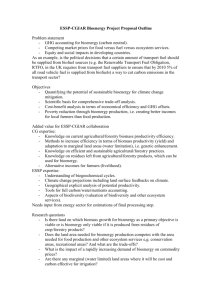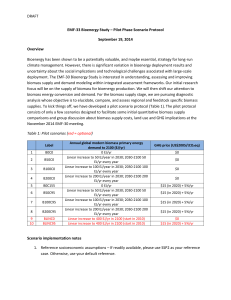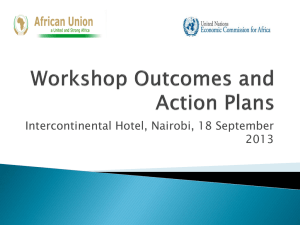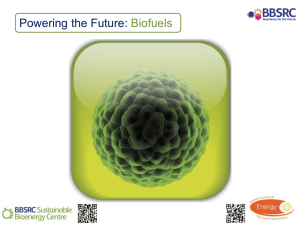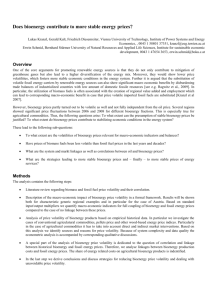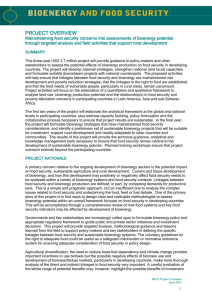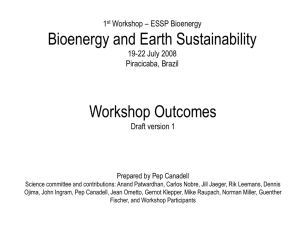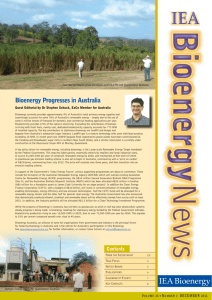Low Carbon Technologies Biorenewables
advertisement
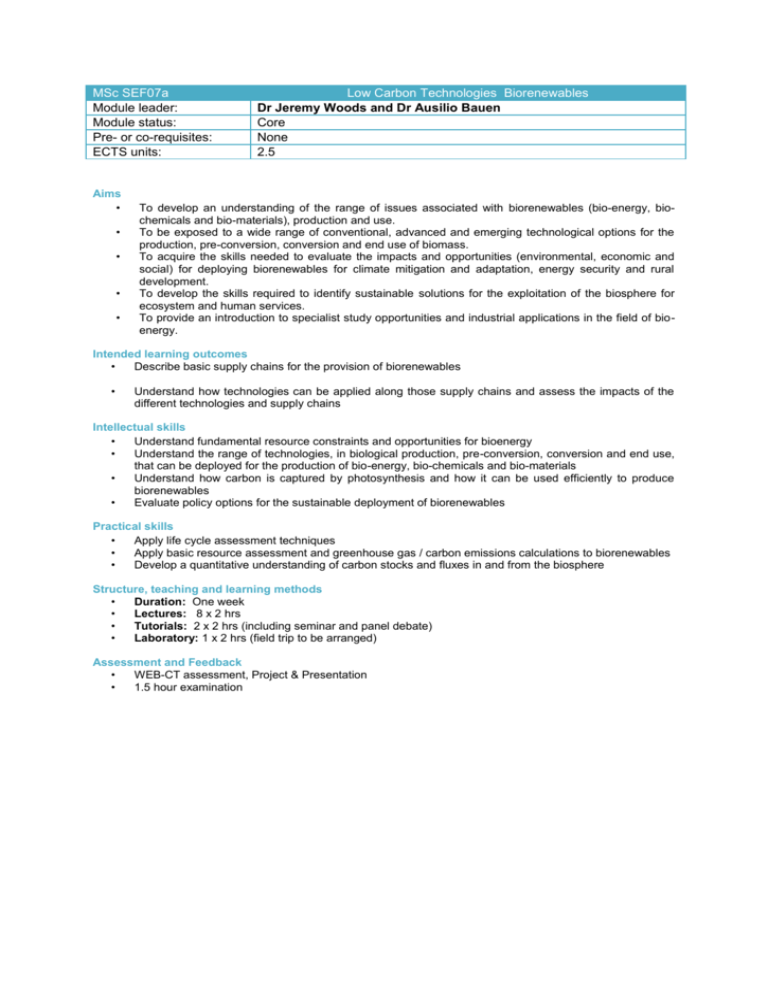
MSc SEF07a Module leader: Module status: Pre- or co-requisites: ECTS units: Aims • • • • • Low Carbon Technologies Biorenewables Dr Jeremy Woods and Dr Ausilio Bauen Core None 2.5 To develop an understanding of the range of issues associated with biorenewables (bio-energy, biochemicals and bio-materials), production and use. To be exposed to a wide range of conventional, advanced and emerging technological options for the production, pre-conversion, conversion and end use of biomass. To acquire the skills needed to evaluate the impacts and opportunities (environmental, economic and social) for deploying biorenewables for climate mitigation and adaptation, energy security and rural development. To develop the skills required to identify sustainable solutions for the exploitation of the biosphere for ecosystem and human services. To provide an introduction to specialist study opportunities and industrial applications in the field of bioenergy. Intended learning outcomes • Describe basic supply chains for the provision of biorenewables • Understand how technologies can be applied along those supply chains and assess the impacts of the different technologies and supply chains Intellectual skills • Understand fundamental resource constraints and opportunities for bioenergy • Understand the range of technologies, in biological production, pre-conversion, conversion and end use, that can be deployed for the production of bio-energy, bio-chemicals and bio-materials • Understand how carbon is captured by photosynthesis and how it can be used efficiently to produce biorenewables • Evaluate policy options for the sustainable deployment of biorenewables Practical skills • Apply life cycle assessment techniques • Apply basic resource assessment and greenhouse gas / carbon emissions calculations to biorenewables • Develop a quantitative understanding of carbon stocks and fluxes in and from the biosphere Structure, teaching and learning methods • Duration: One week • Lectures: 8 x 2 hrs • Tutorials: 2 x 2 hrs (including seminar and panel debate) • Laboratory: 1 x 2 hrs (field trip to be arranged) Assessment and Feedback • WEB-CT assessment, Project & Presentation • 1.5 hour examination Recommended textbooks Category as defined by Central Library: A = required, B = recommended but not essential, C = background reading. A. IPCC (2011) Special Report on Bioenergy. Chapter 2 in; Chum, H., A. Faaij, J. Moreira, G. Berndes, P. Dhamija, H. Dong, B. Gabrielle, A. Goss Eng, W. Lucht, M. Mapako, O. Masera Cerutti, T. McIntyre, T. Minowa, K. Pingoud, 2011: Special Report on Renewable Energy Sources and Climate Change Mitigation [O. Edenhofer, R. Pichs‐Madruga, Y. Sokona, K. Seyboth, P. Matschoss, S. Kadner, T. Zwickel, P. Eickemeier, G. Hansen, S. Schlömer, C. von Stechow (eds)], Cambridge University Press, Cambridge, United Kingdom and New York, NY, USA B. Hunt,S., J. Easterly, A. Faaij, C. Flavin, L. Freimuth, U. Fritsche, M. Laser, L. Lynd, J. Moreira, S. Pacca, J. L. Sawin, L. Sorkin, P. Stair, A. Szwarc, S. Trindade, “Biofuels for Transport: Global Potential and Implications for Energy and Agriculture” prepared by Worldwatch Institute, for the German Ministry of Food, Agriculture and Consumer Protection (BMELV) in coordination with the German Agency for Technical Cooperation (GTZ) and the German Agency of Renewable Resources (FNR), ISBN: 1844074226. Published by EarthScan/James & James, April 2007 Pp. 336 B. Biomass Assessment Handbook (Earthscan): Rosillo-Calle,F.; De Groot,P.; Hemstock,S.L.; Woods,J. (Eds) Biomass Assessment Handbook: bioenergy for sustainable development. London: Earthscan. 244 pages, ISBN: 1844072851. 2006. C. Hall et al (1999) Photosynthesis. 6th Edition. Cambridge University Press. ISBN 0 521 64497 6 A. Sims (ed) Bioenergy options for a cleaner environment in developed and developing countries. ISBN: 0080443516 A. Boyle, Godfrey. Renewable energy. ISBN: 0199261784 B. Bioenergy - a sustainable and reliable energy source. A review of status and prospects, a report for IEA Bioenergy. http://www.ieabioenergy.com/LibItem.aspx?id=6479
